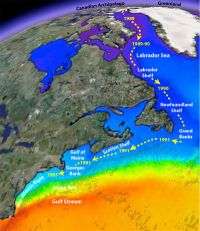'Unprecedented' warming drives dramatic ecosystem shifts in North Atlantic

(PhysOrg.com) -- While the planet has experienced numerous changes in climate over the past 65 million years, the most significant climate change of the last 5,000 years has been in recent decades. That change is global warming.
A Cornell study reports that as a result of this warming, which has caused Arctic freshwater ice to melt and flow southward, the ranges of some cold-water, northern marine species have been moving down the North American coast -- a counterintuitive finding.
The paleo-climate record shows very rapid periods of cooling in the past, when temperatures have dropped by as much as 18 degrees Fahrenheit (10 degrees Celsius) in a matter of years to decades, but "the rate of warming we are seeing [now] is unprecedented in human history," said Cornell oceanographer Charles Greene, the lead author of the study, published in the November issue of the journal Ecology (Vol. 89, No. 11).
During the past 50 years, melting Arctic ice sheets and glaciers have periodically released cold, low-salt water from the Arctic Ocean into the North Atlantic. This has led to dramatic ecosystem shifts as far south as North Carolina and extensive geographic range shifts of many plant and animal species, he said. One microscopic algal species from the Pacific Ocean, not seen in the North Atlantic for over 800,000 years, has reinvaded the North Atlantic from the Arctic Ocean during the past decade.
By reviewing climate changes in the past, the researchers were able to more clearly observe how this influx of fresher water has led to changes in ecosystems as well as the geographic distributions of species, said Greene.
Interestingly, the study's findings run counter to the expectations of most ecologists: They expected that the distributions of southern species would move north and that northern species would lose habitat as the climate warms. Instead, Greene found that as colder, fresher Arctic waters flow south along the Northwest Atlantic shelf, from the Labrador Sea south of Greenland all the way to North Carolina, the distributions of many northern species have actually moved southward.
In addition, the periodic freshening of shelf waters has extended the growing seasons of phytoplankton and tiny drifting animals, like copepods, which make up the base of the marine food chain.
Furthermore, climate changes may have played a role in the decline of cod, a top predator. As cod have declined, populations of prey species have increased.
"While it is true that cod stocks never rebounded from 20th-century overfishing, part of their failure to recover can be attributed to the climate bringing colder waters to Newfoundland since the 1990s," said Greene. Cod don't grow and reproduce as rapidly in the colder water. The decline of cod, combined with the ocean's colder temperatures, has enabled populations of cold-water crustacean species, like snow crab and shrimp, to increase.
"As climate changes, there are going to be winners and losers, both in terms of biological species and different groups of people," said Greene. "The cod fishermen are out of luck, but the fishermen that have decided to go after snow crab and shrimp are very successful now." He added that adapting to climate change is partly being able to predict what we can expect.
The study was funded by the National Science Foundation.
Provided by Cornell University




















